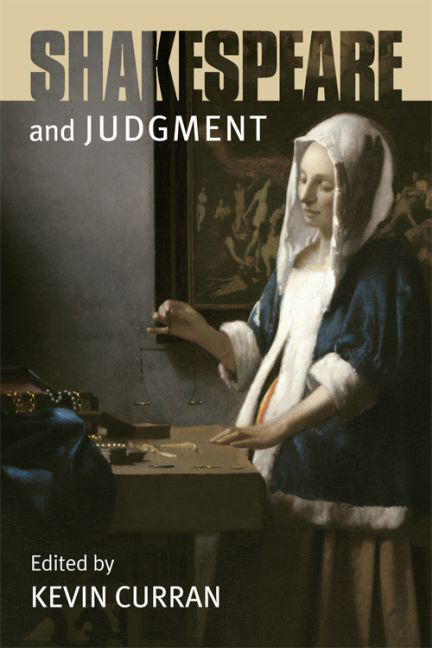Book contents
- Frontmatter
- Contents
- Acknowledgments
- List of Contributors
- Introduction
- Part I Staging Judgment: Deliberation in the Plays
- Part II Audience Judgment: Deliberation in the Theater
- 4 “Gently to hear, kindly to judge”: Minds at Work in Henry V
- 5 “Practis[ing] judgment with the disposition of natures”: Measure for Measure, the “Discoursive” Common Law, and the “Open Court” of the Theater
- 6 The Laws of Measure for Measure
- 7 Prospero's Plea: Judgment, Invention, and Political Form in The Tempest
- Part III The Ethics of Judgment
- Index
5 - “Practis[ing] judgment with the disposition of natures”: Measure for Measure, the “Discoursive” Common Law, and the “Open Court” of the Theater
from Part II - Audience Judgment: Deliberation in the Theater
Published online by Cambridge University Press: 10 May 2017
- Frontmatter
- Contents
- Acknowledgments
- List of Contributors
- Introduction
- Part I Staging Judgment: Deliberation in the Plays
- Part II Audience Judgment: Deliberation in the Theater
- 4 “Gently to hear, kindly to judge”: Minds at Work in Henry V
- 5 “Practis[ing] judgment with the disposition of natures”: Measure for Measure, the “Discoursive” Common Law, and the “Open Court” of the Theater
- 6 The Laws of Measure for Measure
- 7 Prospero's Plea: Judgment, Invention, and Political Form in The Tempest
- Part III The Ethics of Judgment
- Index
Summary
Measure for Measure is not the only Shakespeare play to end with a crowd within the fiction gathered for a final scene of judgment. It is, however, the only play that ends such a scene with such uncertainty for the audience as to how it is to judge what it has witnessed that the play itself appears vitally to concern itself with the audience's capacity to judge. This chapter tackles that theatrical situation from two perspectives: the political implications, in 1604, of the play's appeal to its audience's capacity for judgment and the resonances of the historical concerns for contemporary politics in the twenty-first century. The chapter aims to recognize the historical specificity of the play's interest in jurisprudence, particularly in who has the means and authority to judge in early modern common law, in order to open these concerns out onto the present. The play may be set in a civil law jurisdiction, but at stake in its representation of judgment in the theater is the question of where the authority of the common law resides, who executes it, and what forms of judgment align with it, questions that are just as pressing in 2016 as they were in 1604.
The Common Law's “Reason”
Measure for Measure occupies an important moment in the history of the English common law. It was written and performed in the first few years of the century in which, as the legal philosopher Gerald Postema notes, “modern notions of law took shape.” Central to modern conceptions of the common law is the idea that the common law is “judge-made law,” a conception seen as arising from the work of Edward Coke (Attorney General 1594–1606, Chief Justice of the Common Pleas 1606–13, and Chief Justice of the King's Bench 1613–16). Most famously, in contradiction of James I's claim that he could “take what causes he shall please to determine, from the determination of the Judges, [to] determine them himselfe,” Coke argued for the common law's “artificiall” reasoning or the practice of analogical thinking through which lawyers and justices set the “facts” of a case before them in relation to previous cases like it. The practice, one that depended in Coke's view on “long study and experience,” excluded the king from directly rendering judgment in any case. Under the English common law, Coke insisted, “Judgements are given, Ideo consideratum est per Curiam,” or by a court.
- Type
- Chapter
- Information
- Shakespeare and Judgment , pp. 115 - 138Publisher: Edinburgh University PressPrint publication year: 2017



